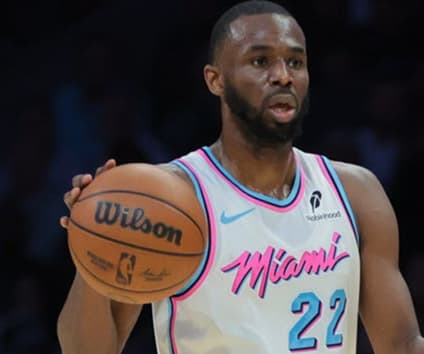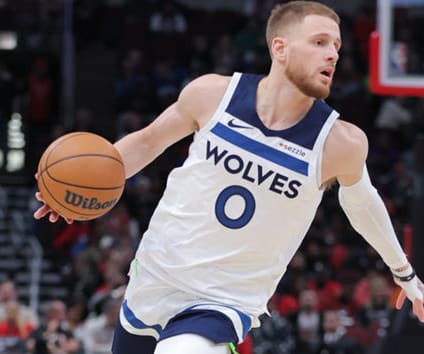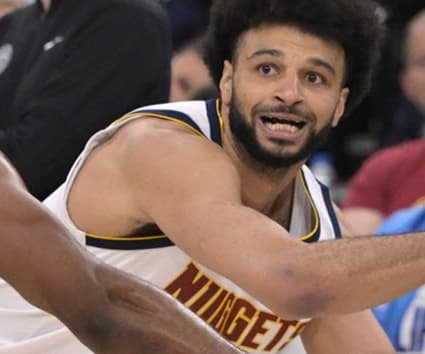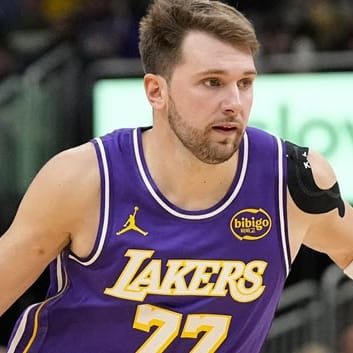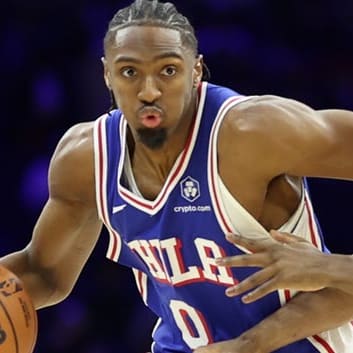Despite age no longer being his friend, James continues to defy father time, once again putting together an elite fantasy season during the 2023-24 campaign. He compiled averages of 25.7 points, 7.3 rebounds, 8.3 assists, 1.5 steals and 2.1 three-pointers in 35.3 minutes per game, good enough for top-20 value in standard leagues. Perhaps even more impressive was the fact he played 71 games, the first time he has eclipsed the 70-game mark since the 2017-18 season. James will turn 40 in December, making him the oldest player in the league. As has been the case for the past few years, the impending drop-off in production could be just around the corner. However, based on what we have seen at the recent Olympic Games, he could very well just continue producing at an elite level. There is a very real chance he slides in drafts, with managers still assuming age will catch up with him. With skepticism still present, James could end up being a nice value pick once again, for anyone willing to plant their flag on the aging superstar. At this point, his floor still feels relatively safe, meaning even if his numbers do take a hit, he should land inside the top 40, come April.
The most enduring image of James' 20th NBA campaign took place on February 7, 2023, when he surpassed Kareem Abdul-Jabbar to become the league's all-time leading scorer. That accomplishment was far from a ride-into-the-sunset moment, however, as James once again played at a level reserved for the game's elite. The ageless wonder averaged 28.9 points, 8.3 rebounds, 6.8 assists and 2.2 three-pointers over 35.5 minutes per contest, shooting 50.0 percent from the field and 76.8 percent from the charity stripe. His defensive numbers slipped a bit -- his 1.5 steals-plus-blocks was the lowest mark of his career -- but that was balanced by the fact that his 3.2 turnovers per game were his fewest since 2012-13. Logic suggests that James has to slow down at some point, yet he remains a physical specimen capable of hanging with players half his age. The rub, of course, is that James hasn't been able to dodge injuries late in his career. He played in only 55 of 82 regular-season contests last season and has missed at least 26 games in four of the past five campaigns. Of particular concern is a foot injury that nearly required season-ending surgery last year and that lingered even as the Lakers advanced to the Western Conference Finals. A bitterly disappointing sweep at the hands of the eventual champion Nuggets in that round led James to briefly hint at retirement, but he's since confirmed that he'll be returning for a 21st season. Los Angeles succeeded in keeping together the core that gelled late in the campaign and into the postseason. In an ideal scenario, that will lighten LeBron's load and prevent him from having to try to carry the team into playoff position as he did most of last season, when the Lakers needed a late push to finish as the Western Conference's seventh seed. Considering his recent history, fantasy managers shouldn't count on James logging a full season of good health in his age-39 campaign, but he's demonstrated time and again that he's capable of elite production when healthy even as he continues to rack up mileage.
Even in a massively disappointing season for the Lakers, James once again defied Father Time, putting together one of his finest campaigns on a per-game statistical basis. The ageless veteran averaged 30.3 points per contest -- his first season over the 30-point threshold since 2007-08. James earned that mark by averaging a career-best 2.9 three-pointers per game and shooting an efficient 52.4 percent from the field. He even improved from the charity stripe, making 75.6 percent of his free throws -- his highest rate since 2011-12. Though his playmaking dipped a bit to 6.2 assists per game, James put up his usual substantial numbers on the boards (8.2 RPG) and even averaged over a block per contest for the first time in 12 seasons. That said, James' fantasy value was impacted by his inability to stay healthy. He often played hurt and sat out 26 games, marking the third time in four seasons that he's played in fewer than 60 contests. The impact of his injuries was especially felt during the fantasy playoffs, as James missed eight of the Lakers' final 10 games. Los Angeles appears increasingly unlikely to make any major additions in the offseason, so James will probably be counted on to carry a heavy load again next to the similarly injury-plagued Anthony Davis and the enigmatic Russell Westbrook. Until he shows tangible signs of a decline in play, it would be imprudent to count James out of being a prodigiously productive player when he's on the court. The question fantasy managers have to wrestle with in deciding how high to draft him is whether the injury risk is worth the per-game reward.
James' numbers during the 2020-21 campaign were mostly unchanged from the previous season, when he finished second in NBA MVP voting. Aside from a marked dip in assists per game (from 10.2 to a still-generous 7.8), the future Hall-of-Famer's per-game stats (25.0 points, 7.7 rebounds, 2.3 three-pointers) were near carbon copies of his regular-season production during the pandemic-shortened 2019-2020 season. What's more, James upped his field-goal percentage two ticks to 51.3 percent and improved his three-point efficiency from 34.8 percent to 36.5 percent. Yet fantasy managers who used an early draft pick to make James the centerpiece of their team last year largely regretted their selection due to the fact that the veteran played in only 45 of the Lakers' 72 regular-season contests. He tweaked his left ankle in a season-opening loss to the Clippers and played through late March despite never fully recovering, then suffered a right ankle sprain that sidelined him for much of the season's second half. A coinciding injury to co-star Anthony Davis and the Lakers' tumble down the Western Conference standings put the onus on James to return before fully healing, and he did so with mostly positive results down the stretch. While the 36-year-old has proven that age can't keep him from being an elite multi-category producer when healthy, the injury risk has to be a concern, especially since James expressed doubt that he'll "ever get back to 100 percent" following his return from the ankle issue. The good news for Lakers fans is that the team devoted the offseason to bringing in a number of reinforcements -- including Russell Westbrook and Carmelo Anthony -- who will almost certainly help reduce James' workload next season. The presence of Westbrook, in particular, will likely cut into James' per-game production, perhaps knocking him into the second round in most fantasy drafts. The tradeoff may be worth it, however, if James is able to parlay the lesser burden into season-long good health.
In his second season with the Lakers and his first with Anthony Davis as a teammate, James continued to be a great fantasy option. He led the league in assists per game (10.2), fueled partially by easy dimes to an excellent finisher in Davis, while also averaging 25.3 points, 7.8 rebounds, 2.2 threes and 1.2 steals. While his free-throw percentage (69.3) continues to drag down James' value, he still ranked eighth on a per-game basis in eight-category fantasy leagues. He'll be turning 36 years old at the start of the 2020-21 campaign but continues to be durable, missing only four total games between the regular season and the Lakers' playoff run to an NBA title. While it's possible that James, as he gets older, will concede responsibilities to Davis, there were no true signs of his slowing down last year. The Lakers also re-tooled the surrounding roster, adding Dennis Schroder, Montrezl Harrell and Marc Gasol -- which could make it easier for James to take nights off during the upcoming squeezed 72-game campaign. Fantasy managers shouldn't be surprised if more rest days are in store for James, which is something to keep in mind before drafting him. Still, it wouldn't be surprising if he remained a first-round fantasy value.
After 15 years of being one of the most consistently durable superstars in NBA history, James finally showed signs of wear in 2018-19. The 34-year-old missed a career-high 27 games -- most of which were due to a groin strain suffered on Christmas Day. While James was able to return before the end of January, it was too late to save the floundering Lakers, who struggled to a 6-12 record in his absence, falling out of playoff contention in the process. Back for Year 17 with renewed focus, and a revamped supporting cast headlined by Anthony Davis, James will seek to prove he's still arguably the best player in the NBA. When James was on the floor last season, his production -- 27.4 points, 8.5 rebounds, 8.3 assists, 1.3 steals, 51% FG -- spoke for itself. But he'll need to stay healthy, and engaged, for the Lakers to reach their ceiling as one of several title contenders out West. The same goes for James' fantasy value, which remains elite but has tailed off slightly in recent years. The four-time MVP should be among the league leaders in counting stats once again this season, but he's taken a noticeable step back on the defensive end, while his free throw shooting reached new depths (66.5% FT) a year ago. Outside shooting is also somewhat of a concern for James, who's proven to be a dependable threat from downtown over the course of his career but hit less than 34 percent of his 5.9 three-point attempts per game last season. The addition of Davis should help breathe new life into James, and reports that he may end up serving as the Lakers' starting point guard will only boost his already-gaudy assists numbers. Overall, assuming he can stay healthy, James is an elite fantasy commodity who warrants first-round consideration in many leagues.
Last year, to cap off his second stint with Cleveland, LeBron led the league in minutes (3,026) and points (2,251) while playing all 82 games at 33 years old. He also set a career high in assists per game (9.1), which ranked second in the NBA, and matched his career-high 8.6 rebounds per game. The King also remained as efficient as ever, setting the third-highest true shooting percentage (62.1) of his career. Speculation about his potential departure from the Cavaliers for a second time began as a result of the team’s poor play, largely resulting from moves made to accomodate Kyrie Irving’s trade request. The Cavs finished fourth in the Eastern Conference and, despite getting swept in the Finals by Golden State, LeBron played his most playoff games in a single season since 2012-13. Opting for a change of scenery, LeBron agreed to a four-year, $153.31 million contract with the Lakers on July 1. While it shouldn't be banked on that he'll lead the league in minutes again, it’s hard to imagine a scenario where LeBron isn't worth a top-10, if not top-5, pick in the vast majority of Fantasy leagues this season.
James put together another spectacular year in 2016-17. Despite playing in his 14th season, he played a whopping 37.8 minutes per contest, while missing a total of just eight games. His averages of 26.4 points, 8.6 rebounds and 8.7 assists, were up from 25.3, 7.4 and 6.8, respectively. He still got it done on the defensive side of the ball with 1.2 steals and showed some improvement as a three-point shooter with 1.7 per game, while shooting 36.3 percent from deep, which was a vast improvement from the 30.9 clip he shot a year prior. While nearly averaging a triple-double would likely put James into consideration for league MVP honors in previous seasons, he was actually left out of the final vote, with the likes of Kawhi Leonard, James Harden and Russell Westbrook securing the three finalist spots. Still, it was another season where James showed no signs of slowing down. James picked up his 13th straight All-Star appearance and earned his 11th total All-NBA First Team honors, while also leading the Cavaliers to the NBA Finals for the third straight season. Looking ahead to the 2017-18 season, the Cavaliers' lineup will look a bit different, as Kyrie Irving was traded to the Celtics in exchange for Isaiah Thomas, Jae Crowder and Ante Zizic. Thomas should have the biggest impact on James, as he averaged 28.9 points per game last season in Boston, which was good enough for third in the league. While that could potentially take away a shot or two from James, he's still going to be the go-to player and it shouldn't result in much of a change in terms of his production. Heading into his 15th NBA season, the ageless James shouldn't have much of a drop-off in terms of his Fantasy value, making him a top-10 pick in the majority of leagues due to his stellar contributions across a plethora of categories.
James turned 31 last December, but that didn't stop him from putting together one of the most efficient seasons of his 13-year career. Playing in 76 games, James averaged 25.3 points, 7.4 rebounds, 6.8 assists and 1.4 steals per game while shooting 52 percent from the field. It was the sixth time in seven years that James has eclipsed the 50-percent shooting plateau, though his stroke from beyond the arc regressed significantly. After shooting 35.4 percent from distance in 2014-15, James converted only 30.9 percent of his long-range attempts last season, the second-lowest rate of his career. Still, James managed to navigate the Cavaliers through the Eastern Conference playoffs with ease before leading an improbable comeback from a 3-1 series deficit to defeat the Warriors in the NBA Finals. By winning his third ring, James exorcised perhaps his greatest demon: bringing a championship to Cleveland and achieving what he was unable to do during his first stint with the Cavaliers. James enjoyed one of the best Finals performances of all-time, averaging 29.7 points, 11.3 rebounds, 8.9 assists, 2.9 steals and 2.3 blocks in nearly 42 minutes per game to claim MVP honors. After putting up 41 points in Games 5 and 6, James capped the legendary series with a 27-point, 11-assist, 11-rebound triple-double in a hard-fought Game 7 victory. James, who re-upped with the Cavaliers this offseason on a three-year max deal that will allow him to opt out after the second year, joined a number of other marquee players in skipping the 2016 Summer Olympics in Rio de Janeiro, so he'll enter the 2016-17 season well rested and without the burden of extreme expectations on his shoulders. There's been speculation that it could result in James coasting through the regular season, but even if that is the case, he'll still likely finish around the top 10 fantasy commodities in the league.
Although he fell two wins shy of his reason for returning to Cleveland, James' first season back as a Cavalier was largely successful. The three-time MVP was able to advance his team through the playoffs despite his All-Star cohorts, Kevin Love and Kyrie Irving, falling during the postseason. The regular season was not without its bumps and bruises for James because he missed a career-high 13 games, including a two-week sabbatical at the turn of the calendar. For the regular season, James' numbers were down a tic for the most part. He averaged 25.3 points on 49 percent from the field and 71 percent from the line with 1.7 three-pointers, 6.0 rebounds, 7.4 assists, 1.7 three-pointers, 1.6 steals, and 0.7 blocks. His assist average was highest since his last season in Cleveland. The 12-year veteran continued to log heavy minutes at 36 per game, and that number bumped up to 42 in the playoffs. The Cavaliers may need to monitor James' minutes in an effort to keep him somewhat fresh for the postseason. His playing time has been on a slow decrease over the past six seasons, but a dip below 35 minutes per game (and another mid-season break) would have a corresponding reduction in productivity.
LeBron James has returned to Cleveland after four years in Miami. While James gave up the position as the top ranked fantasy basketball player to Kevin Durant over the last couple seasons, he still put up excellent all-around numbers last season. Through 77 games, James averaged 27.1 points, 6.9 rebounds, 6.4 assists, 1.6 steals, and 0.3 blocks (a career low) in 38 minutes. The four-time MVP hit a career-high 57 percent of his field goals, while hitting 38 percent of his three-pointers (1.5 three-pointers per game), and 75 percent of his free throws. His value should not change significantly in his return to his home state. Even with teammates like Kevin Love and Kyrie Irving, James should be the focus of new coach David Blatt's Princeton-style offense. He should have the ball in his hands a great deal, and his counting numbers should remain excellent. The one concern is that James has played very heavy minutes through his 11-year career, and Blatt may want to manage his minutes in a Spurs style that utilizes a deep rotation to limit his players' minutes. James looked like he lost significant weight this offseason, which may allow the superstar to play more minutes, but he may also spend less time in the paint. After spending four years as the NBA's villain after The Decision, James should revel in the love of his well-received homecoming.
It's common knowledge that James is the best player in the league, and has been for several seasons, which makes it a little scary that he set career bests in rebounds (8.0 per game), field-goal percentage (57 percent) and three-point shooting percentage (41 percent) in 2012-13. His improvement in rebounding was marginal, but he took great leaps in his shooting efficiency, up from 53 percent from the floor and 36 percent from downtown in 2011-12. Considering he has basically never regressed, an optimist could expect further improvement this season, as crazy as those numbers would theoretically be. But it should also be noted that his counting stats are unlikely to increase, considering that the Heat will have no reason to play James as much as his talent dictates. Miami's 27-game winning streak required the stars to play more than they otherwise would have last season, and assuming the No. 1 seed will be all but in the bag at some point in the second half, coach Erik Spoelstra could start resting guys in a Popovich-esque manner. If the only knock on a guy is that his team might be too good, then we're clearly nit-picking, but it is worth noting that James only played in four of Miami's final 10 games last season, which could prove disastrous in weekly leagues if it happens again.
James played the most efficient basketball of his career last season, shooting 53 percent from the floor – easily a career high. By taking more shots in the post and shooting a career-low 2.4 three-pointers per game, the NBA’s three-time Most Valuable Player found a way to become even better. His counting stats are always gaudy, and last year he averaged a career-high 7.9 boards to go with 6.2 assists, 1.9 steals and 0.8 blocks per game. It was clear throughout the regular season, and especially in the postseason, that Miami is James’ team and Dwyane Wade has taken a back seat to the king. He proved last season that he is always trying to get better, and after helping the U.S. Olympic team win a gold medal in London, James will be back with the weight of having won his first NBA championship off his shoulders. In addition to always putting up incredible numbers, James has never missed more than seven games in a season, so his productivity comes with some assurance. He is certainly worthy of consideration for the No. 1 pick in fantasy.
James saw his numbers dip ever so slightly during his first season in Miami, but that should have been expected. Playing next to Dwyane Wade, James had to share the ball for the first time in his career, so there were fewer opportunities to dominate his team’s stats. James’ assists, points, and blocks regressed slightly last season, but with James just 26 years old entering next season, there’s reason to believe he could regroup to post career-best numbers in the future. The Heat overhauled their roster in free agency last season, and even though they finished with the second-best record in the East, they had their share of road bumps. With a full season under his belt to learn how to play with his teammates, and a devastating collapse in the NBA Finals to provide motivation, it’s a safe bet that James will have a chip on his shoulder this season. While Kevin Durant is considered the consensus top pick in fantasy – thanks in part to his superior free-throw shooting – there’s an argument to be made that James’ contributions in the assist department make him nearly as valuable.
There might be people who don't know their David Lee from their David Lee Roth, but LeBron James is an icon. Of course, the chances of his notoriety artificially inflating his draft position are low: he's likely the second-best player available right now, and isn't a crazy stretch at number one. In other news, there are reasonable questions to ask about how LeBron's Decision – and how being partnered alongside two regularly elite fantasy producers in Dwyane Wade and Chris Bosh – will affect his numbers. The quick answer is: not much. The slightly longer answer is this: LeBron and his owners might see a small drop in his scoring. There's an equal likelihood that some other things will increase, like his assists and his field goal percentage (already pretty excellent last year at 50.3). Furthermore, those in 9-cat leagues might very well be happy with LeBron's move, which will likely help his turnover numbers, too. The thing likely keeping James from topping the fantasy charts in 2010-11 is the same thing that's depressed his fantasy value in the past –
James is coming off one of the most impressive individual seasons in recent memory, leading a less-than-stellar supporting cast to 66 wins with off-the-scale numbers in the advanced stats like PER and on-court/off-court plus-minus. But the Cavs lost earlier than expected in the playoffs. That’s a great thing for James’ fantasy owners this year because he will be playing with something to prove. James remains the most physically gifted player in the NBA, combining Karl Malone-like size (6-9, 260 pounds) with Allen Iverson-like foot speed. There is nothing that he can’t do on the basketball court, which means that he can (and does) fill every stat on the roto sheet as well as anyone. James was second in the NBA in scoring last season at 28.4 points per game while also notching well over seven boards and seven assists per. He also added almost three combined steals/blocks and 1.6 treys per game while shooting career-bests of 48.9 percent from the field and 78.0 percent from the line. The shooting percentages are key because James led the NBA in free throws made and finished third in field goals made – meaning his percentages yield high impact. And amazingly, despite being six years into the league, the 24 year-old James still has upside to his game. If he were to add a post-up game on offense any time soon he would be completely unguardable. Even failing that, James should continue to put up video game numbers and deserves consideration as the top pick in fantasy drafts.
This summer, James lost a game of H.O.R.S.E. to some guy who works in a warehouse. That’s the only indication we’ve seen in a while that King James is actually human. LeBron is an evolutionary version of Magic Johnson – a remarkable combination of speed, size and skill who would be equally effective at point guard or center. He’s coming off a season in which he led the NBA in scoring (30 ppg) while posting career-highs in boards (7.9) and assists (7.2). Those are “MJ in his prime” numbers. James also posted a career-best 48.4 shooting percentage from the floor. For a mere mortal, we’d call it a career year – but the King won’t see his 24th birthday until Christmas week, and still has plenty of room for improvement. He’s on the very short list for “top overall pick” in any fantasy NBA format… except Fantasy H.O.R.S.E. For that, type “the warehouse guy” and “LeBron” into your favorite search engine.
With James coming off a career season, you might wonder whether he can still get better. But James only shot 71 percent from the foul line and 31 percent from long range. These are the two main areas in which LeBron should improve significantly. If that were to happen, he'd be worthy of the number one overall pick – his scoring, rebounding and assist combination is totally unmatched. Keep in mind that if he doesn't improve at the charity stripe, his below average shooting hurts more than usual because he attempts more than 10 per game.
At the tender age of 21, LeBron established himself as the most complete player in fantasy basketball last year. He averaged 31.4 points, 7.0 rebounds, 6.6 assists and 1.8 steals on 48.0% shooting from the field and he’s only going to get better. It’s scary to think what his ceiling could be when you look at last year’s numbers, but LeBron can do it all for your fantasy team. He was second in the league in minutes played last year (42.5 minutes per game), and despite averaging 41.5 minutes a game in his career, has only missed eight games in three years. At 6-8, 240 lbs., he has the three-point range (1.6 threes per game last year) to stretch the defense but can also get to the rim at will (average of 10.3 free throw attempts last year). LeBron is the best all-around fantasy player in the game and will be a perennial number one pick for years to come.
We're going to spend the next 10 years or so looking for new and better ways to say what's most simply put thus: King James. LeBron was arguably the best fantasy player in the game last year, only the fifth player in NBA history to average better than 25 points, seven rebounds and seven assists in the same season. So where do his numbers go from here? James can seemingly score at will and vie for the league scoring crown, having improved greatly in shooting from the field and beyond the arc. But it's likely that a reinforced Cavs squad, with ball-hungry Larry Hughes on board, will take some touches and scoring chances away from the pass-first star. Scottie Pippen never stopped Michael Jordan from scoring, but Hughes is higher maintenance and in a less structured offense. The addition of spot-up three-point shooters like Donyell Marshall does bode well for a bump in assists. The one area in which James is below replacement level is his 75% free throw shooting. An improvement there alone could easily make him king of the fantasy ranks. That he's entering just his third year itself argues for further all-around development.
James answered all his critics last season and then some, claiming stake to the NBA Rookie of the Year award. James showed flashes of his much-hyped brilliance, tickling his owners with his uncanny ability to distribute the ball and score points. James will certainly be looked upon to up his points per game this season, as Cleveland management fumbled the ball with Carlos Boozer. The arrival of Eric Snow shouldn’t affect James’ assists totals too much, as James is an unselfish player who looks pass-first frequently. James will be even better in his sophomore campaign, as scary as that may be, and has the talent to play at a first round pace as soon as this year. James figures to be taken in the mid second round, but don’t be surprised if a team with a late first round pick snags him and banks on his seemingly unlimited potential.
After indicating that James would be the Cavs' starting point guard in 2003-04, coach Paul Silas backed off on that, fearing it would be too much for the rookie. James will now start the season as the shooting guard or small forward. He'll still receive plenty of touches and the offense will often run through him, so he still may be a source of assists. If the Cavs find a comfortable spot for James, he could blossom into their leading scorer, but will have to fight for shots with Ricky Davis. There will be lots of pressure on him, and he may be overhyped at your draft or auction.










